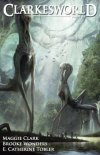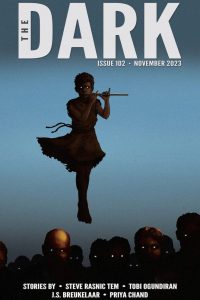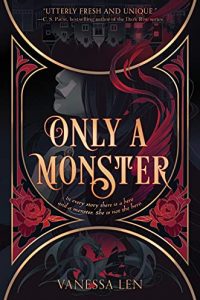Lois Tilton reviews Short Fiction, early November
Again no digests, so here are the first of the month ezines and some other stuff I didn’t have time to fit into the column in October. The Good Story award goes to the Robert Reed novella.
Publications Reviewed
- Clarkesworld, November 2012
- Apex Magazine, November 2012
- Bourbon Penn #5, September 2012
- Three-lobed Burning Eye, October 2012
- GigaNotoSaurus, November 2012
- The New Yorker, October 15, 2012
- “Eater-of-Bone” by Robert Reed
Clarkesworld, November 2012
Another good set of stories. Again, Clarkesworld doesn’t disappoint.
“(To See the Other) Whole Across the Sky” by E Catherine Tobler
The problem being the crewing of cargo ships across interstellar distances, deemed necessary in case the automatic systems happen to fail. Because more than one human confined in such conditions has a strong tendency to result in some sort of disaster, the solution turns out to be loners, humans who prefer to avoid the company of others. Yet total solitude can be just as problematic, so the singleton-crewed ships are paired with others to provide a bond of communication.
While suicide remains a concern in certain circles—circles that will never reach the uppermost levels—we are used to anhedonic wonderlands, to agoraphobic serenity. With a communications unit for holographic interaction, we do what we do best: talk behind our aliases as we ensure the natural hum and shiver of the machines around us. For a loner, this is the precisely perfect occupation, a diet of minimally-invasive companionship that can be closed at a moment’s notice.
A fine example of literary SF. In a way, it’s a love story. Or a contemplation on solitude and distance. The single-crewed ship is anything but a new thing in SF, but rarely is it done like this.
–RECOMMENDED
“Aquatica” by Maggie Clark
Another premise that seems quite familiar: aquatic beings on another, ice-covered world [Europa? Enceladus?] who look upward towards their frozen sky. There is profound sexual dimorphism: males [Organs] live briefly, only long enough to merge with the much larger Hosts. Our Organ, however, has conceived the notion that there must be a meaning to his existence beyond procreation; he would like to see the rumored hot current that breaks through the surface of the ice into whatever lies beyond. But he is aging, weak and starving, and now a Host has discovered him.
Sure enough, two others were already fused to Host’s underside—the first recent enough that one dull eye still gazed back; the other reduced to little more than his seed, a dangling pair of gonads with no speech, no sight, no mind. In his hunger, Organ felt a muscle-cramping urgency to bite into Host’s skin. The proximity of her pheromones did not help.
What follows isn’t really a love story, but the story of two beings that come to understand and respect each other in a way neither of them had expected. They are both unusual individuals of their kind, and I can imagine the possibility that the union of these two might result in something evolutionary. The conclusion is even more unexpected, and I think readers will be split between those who consider it a Very Neat Thing and those who are disappointed. Again, a premise that’s been used before, but given interesting form here.
“Everything Must Go” by Brooke Wonders
Sentient houses. The story views the house’s inhabitants through the lines of the real estate listing, and we learn the family’s secrets as it disintegrates.
Downstairs master bedroom for maximum privacy.
The walls shout louder and louder, the house hating every resonant echo, until the only way the kids can sleep is by pressing palms deep into their ears.
But this is only the beginning of the weirdness.
A dark domestic fantasy that actualizes the metaphors of family dysfunction, tearing it apart and shredding it. We realize this one is going to be something different when we see that the family’s son is actually growing wings, which his mother, who has turned invisible, tries to clip with her scissors.
–RECOMMENDED
Apex Magazine, November 2012
Two short-shorts and a longer short this time.
“Splinter” by Shira Lipkin
Messing around with things you shouldn’t. The nameless narrator and a bunch of friends find/open a gap in reality and jump through. This has the appearance of a friendship story, but it’s a chance friendship at best. The narrator seems to feel guilty about what happened, but we have insufficient information about these people to know whether this is justified. But the narrator claims, “I never saw them again,” yet describes the current circumstances of the other survivors, which suggests this is a lie.
A slight piece. The only message seems to be that people will do foolish things when they’re young and foolish.
“Erzulie Dantor” by Tim Susman
Haunted Haiti after the quake, where everyone in the village knows why one woman’s house remains standing among the ruins. She has a jealous sister, who complains, “Her house is cooled by the spirits of the night. Maisie keeps the best breeze for herself and sends the hot island air down to us.” But Sirène has a husband and baby, as her sister does not. And when a demon comes to steal the child, she knows who has sent it.
Her eyes meet Maisie’s, and the spiders crawl out, just a touch. Maisie knows all the things that are not being said, the small jealousies and grievances that accumulate in a family like cracks, the larger ones that crush love into hate.
But the gods have the last word.
This story of sisterly enmity makes the most of its setting and the rich Haitian mythos.
–RECOMMENDED
“Sprig” by Alex Bledsoe
Fairies at the Renfaire. Four-year-old Cyrus has an Encounter. Not as mawkish as it could have been.
Bourbon Penn #5, September 2012
The issue’s editorial blurb says it features “stories of the imagination and the odd.” There are seven pieces, quite short, more and less odd.
“Everything You Were Looking For” by Samantha Henderson
Seven years ago, Paul’s pregnant wife was lost in a cave-in during an earthquake in the south of France. Before she disappeared, she claimed there were cave paintings on the walls.
They’re black and a sort of deep red. Orange. There’s hundreds of them. All sorts of animals. More than I can see. They’re beautiful. Like they’re in motion.
Every summer since, he’s returned to search for her. Now, at last, he’s discovered the cave that swallowed her. But Paul hasn’t come to find her bones, because the last thing she told him was, “I’ll wait.”
A story of powerful love and very old magic. The author creates a convincing narrative.
“American Marsupial” by Clifford Garstang
Danny tends to freak out. A lot. When the Washington Monument is felled by terrorists, he seeks comfort.
Danny deposited his briefcase on the counter. He felt the sensation of dust on his tongue, unclipped the cellphone from his belt, lifted his wife’s skirt, and climbed into her womb.
This, apparently, is meant to be literal. Biologically absurd, psychologically Danny takes the notion of Mommy’s Boy to new lows.
“On that Time We Crossed” by Sam Duda
During some unexplained apocalypse, a family is on a trek attempting to reach Mother. There are Father, Mark, and the narrator, along with the woman the keeps addressing in the 2nd person, who may be his sister or his wife, who seems to have visions. She falls, she can’t go on, he has to carry her.
It was too much. You pulling down, cold on my neck, the ropes burning into my stomach and tearing at my flesh. I stopped and took you from my back and lay you in the grass in front of me, your mouth hanging open, flies at your half closed eyes.
The scenario is hallucinogenic, fevered. Nothing is clear. We can be pretty sure the woman is dead at some point – thus the crossing – but not exactly when.
“The Rustic Ladder” by Daniel Ausema
In some unnamed country [Madagascar?] in the same world where we live but perhaps not at the same time, where European colonial masters live in manor houses and lord it over the native underclass. The narrator’s mother works as a cleaner in the manor and sometimes brings the narrator to help, where he fantasizes about an old ladder displayed as an antique.
But then when I’d done what I could to help, while we waited for sheets to dry outside or the slippery water on the floors to evaporate, I could go down to that silent sitting room and stare at the ladder.
I imagined what world it would take me to, if I only dared climb it.
The story is about the power of imagination and hope, but it’s the setting that intrigues with hints of strangeness, as in the flying people who occasionally appear in the narrator’s town. It’s tantalizingly both grounded in and removed from our own world.
“The Day of the Creamsicles” by Don Raymond
Susan has taken the Job From Hell, that was supposed to be assistant manager at an apartment complex but turns out to involve peddling a balky ice cream vending cart around the grounds.
A combination of silliness and happy revenge.
“Faded Dreams of Division Street” by Wayne Allen Sallee
A Chicago story – gentrification and nostalgia. Division Street isn’t what it used to be in Algren’s day. The sort of piece that creates its local atmosphere with a thick layer of names, but the authenticity slips when the text misspells the name of Drewry’s beer.
“Lucky” by Jeffry Wooten
You might think that having what amounts to superpowers might be an asset. For Henry, it’s only brought trouble and abuse.
But mostly, I remember the fire. The way it danced for me at night. The way I learned to hide it and call it only when I knew I was alone. I remember that I wasn’t always successful and paid for my mistakes in blood and pain.
Seems to me that it takes Henry an awfully long time to make his assets into assets.
Three-lobed Burning Eye #22, October 2012
The masthead of this semiannual zine proclaims that it includes Horror, Fantasy and Science Fiction, but most of the six stories here are dark fantasy; I wouldn’t call any SF.
Unusual, highly imaginative tales, a notch above the usual fare from small ezines.
“Ladybird” by E Catherine Tobler
The Sirens still prey on men, as they come to the ruins of their temple to be tormented by the pleasure of their song.
The bound man had never graced this house before. The song deepened and his body shook and just when it seemed he might truly fall apart, he became utterly still. I watched him in the shadow of my wings and sang a final note, letting it taper off. A final breath of sound echoed down the copper channels.
This one, however, is an artist, and the siren who sings to him is intrigued by the vision she sees in his work. He wants to create her in marble, and she allows it, even fighting off her jealous sisters.
A nice reworking of this myth, retaining both the predatory nature of the sirens and the fatal compulsion of the men drawn to them.
“The Eel Question” by Mae Empson
Janika’s father is a naturalist studying eels, and Janika wants to emulate him to earn his approval. He has challenged her to propose an eel study of her own, and she decides to test a legend that application of eel oil will enable a person to see fairies.
“My hypothesis is that applying the eel oil will cause me to see something which I have never seen before, which I could then describe and sketch in my journal for comparison to known natural creatures. The null hypothesis is that I see nothing new. That much should be verifiable.”
So much here is delightful – Janika’s grasp of the scientific method, the tantalizing quotations from Freud’s study of eels, the unexpected secret twist that alters the story completely. I only wish the author hadn’t felt the need to paste in a Message in the last paragraph.
“Riding Atlas” by Ferrett Steinmetz
Consanguination, the latest fad. Stewart has unenthusiastically come to try it at the urging of his girlfriend Tina, fearful that he might lose her if he wimps out.
The attic floor was covered with bodies, lying belly to swollen belly on bedbug-blackened box springs. Their arms were thrust out above their heads, ears resting on their biceps; they clasped hands like lovers, each couple’s circulatory systems knitted into a single bloodstream.
But in addition to uniting with each other, Tina promises, at the peak of the experience they’ll unite with the godlike Atlas.
An ambiguous fantasy in a revolting setting, which the author casts as the most disreputable sort of shooting gallery. Readers will first share Stewart’s revulsion at the entire business and the filthy surroundings, the bedbugs and bloodstains, his certainty that he’s making a big mistake here, his sensations and misgivings as the process takes hold. At one point, he’s convinced some kind of drug is involved, and so it may seem to readers, that the entire experience is hallucination, which is easier to credit than the shared experience of communing with an indefinable entity. But the strongest impression is that of the attic where it all takes place, and the degree of desperation it must take not to run rapidly away from such a place for fear of infection.
“Hoarfrost” by Michelle Muenzler
Winter fertility rites in which women are impregnated with snow and mate with bearskins for warmth. The narrator’s pregnancy has failed, remains frozen inside her, while she is frozen to her dead husband-pelt. She is jealous of her sister.
I do not want to see the crackling shard cradled in her arms, the purple iridescence of its hunger, or the green glaze that signals its other needs. I do not wish to see her ice-baby.
This very short piece is a thing of imagery and metaphor, only hinting indirectly at meaning.
“The Book in Dutch” by M Bennardo
Lynd is a sort of antique book collector who acquired the occult book, which isn’t actually written in Dutch, in a mixed lot and never looked into it closely until he was forced to move. Astonishingly, the pages are at one moment indecipherable, then he can make out the meaning in the words.
But as soon as Lynd began to grasp what was happening, the words disappeared and the gibberish returned. It was only when his mind wandered — when he viewed the printing out of the periphery of his mind, as it were, that anything seemed to make sense. Lynd let his mind wander away again, and when the words took on their secret shapes, he read on:
This, however, is only the beginning of the book’s transformative powers.
The accursed book is a classic dark fantasy premise, and here’s a neat, sinister twist on it.
–RECOMMENDED
“Judith of Lions” by R S Bohn
Post-apocalypse. Judith and Gwen were running a lion sanctuary/research center when the undefined plague/disaster struck.
When the reports on television showed dead crows littering the highway, dogs staggering in pastures, cows bellowing as they were ravaged by something other than lions, she repaired the gate as best she could. Loops of chain, hammering the bars as straight as she could. The lock was unsalvageable. Everything was unsalvageable.
Now Judith is under siege by the lions, which may be zombie lions, and a feral child that may be Gwen, reincarnated as a zombie or werelion. These matters are obscure, either because the author intends this or can’t write clearly, I’m not sure which.
GigaNotoSaurus, November 2012
“Woman of the Sun, Woman of the Moon” by Benjanun Sriduangkaew
Variation on Chinese myth in which the archer Houyi who shoots down the rogue suns is a woman. Although of divine rank, she was not readily accepted in heaven as a female martial god, and her marriage to Chang’e, wife and wife, is even less tolerated. After Houyi kills the suns, she is exiled to mortality and Chang’e leaves heaven to be with her. Among mortals, their marriage encounters even greater hostility. Together, they embark on a question, not for divinity but eternal life.
A world is born between them where only they exist–Chang’e and Houyi, Houyi and Chang’e. Traders that they meet at all, for they avoid the mapped and trodden roads, are irrelevant. Sometimes conveniences, other times momentary irritants. Every few days one of them would have to remind her wife, We seek Xiwangmu and her treasures, which are said to confer unending life.
An interesting idea to recast this myth in terms of contemporary feminism, except that the contemporary feminism is alien and intrusive. Yet considering where the heart of the story lies, I find that the element doesn’t really need to be there to make the story work. There’s plenty of room for the eternal love of Houyi and her wife Chang’e without the homophobia of heaven and earth intruding.
The New Yorker, October 15, 2012
“The Semplica-Girl Diaries” by George Saunders
Narrator = loving father of family. Father = up to eyeballs in credit card debt. Feels bad because can’t give teenaged daughter extravagant birthday party.
Father wins lottery. Blows entire wad on extravagant birthday party, including latest fad for SG display. Fails to read fine print in SG contract.
Youngest daughter = oversensitive. Worries that SGs aren’t happy hanging in yard by line strung through heads.
On one level, a Cautionary Tale about the perils of conspicuous consumption. The narrator is a loser, but he’s a fundamentally kind, loving husband father, willing to sacrifice [too much] for the sake of his family. He’s capable of recognizing, to some extent, that there might be something wrong with exploiting third-world girls who’ve sold themselves to be lawn ornaments for the rich, but despite twinges of guilt, he rationalizes the situation. In another place and time, he’d be the sort of kindly father who would have bought his child a little black slave page in a turban, to fan her with ostrich plumes. And told himself the slave was better off in his family than he would have been in the jungle.
By keeping the narrator’s family and financial woes in the foreground, the issue of the SGs is increasingly thrown into deep contrast. The situation is surreal, but this only draws attention to the wrongness by piquing the reader’s curiosity. While Saunders leaves the connection up to the readers, we easily recognize that the situation of the SGs symbolizes the exploitation of third-world workers today, who often sign very similar contracts indenturing themselves to labor far from home in construction or home servitude. As well as the situation of workers crowded into industrial barracks to produce the consumer electronics that our spoiled children demand and for which we are willing to go into debt to acquire. Because we love our children so.
Subtly, ironically devastating.
–RECOMMENDED
“Eater-of-Bone” by Robert Reed
In a moment of confusion, I mistakenly believed this story was an individually-published novella, when in fact it’s the title story of a novella collection. But, as long as I’ve got it here . . .
On a world where humans are aliens and monsters, where peril is ubiquitous, a resourceful young human woman is pursued by enemies, killed, and washed into the river. In this universe, human bodies have been engineered to survive such accidents as death.
If just one of those ingested phages lost its ancient safeguards, then it would duplicate itself at a staggering pace—billions of machines trying mightily to transform native flesh into the healthy body of a human female. But even with those dangers, her body was steadily bitten and masticated and then vomited up again. Nervous systems failed; metabolisms collapsed. Her drifting corpse created a zone of misery, the dark winter water full of twitching fins and abortions as well as a succession of increasingly grim fish kills. But that slaughter proved endurable for some species, and for a lucky few, there was uncommon wealth. Deep-swimmers tasted the mayhem, and once the rough soup was diluted enough, they rose up to drink their fill. A flight of hack-a-leens descended on the water’s skin, claws cutting through and the long necks leading down to where they would nab tiny, precious meals. After two nights and a day, the deep expanse of the bay had absorbed much of her potassium and phosphorus, while her stolen iron and calcium fueled a million quiet wars; and during the second day, a remarkable midwinter bloom made the water glow with a vivid, milky light.
Now that is description! Prose so well-crafted and fascinating as to be in itself entirely sufficient, without generating the impatient readerly urge to know who this human is and what is going to happen next. Of course Reed gets around to such matters at his own pace, when eventually her body ends up on an island where an ancient giant monster lives, one of the original human colonists stranded on this world thousands of years ago. And plenty of things do begin to happen next.
This is a Great Ship story, although the ship itself appears only in distant memory. What matters is the humans, the immortal products of the ship’s universe, and this immortality lies at the story’s heart. As well as its cost. Humans are known on this world as eaters-of-bone, because only through anthopophagy can they accumulate the necessary trace minerals to carry on life. These are posthumans, like us but unlike us in fundamental ways. Ultimately, the question is: what is the essence of human life? How much can we change before we’ve become a essentially different thing?
–RECOMMENDED







Pingback:Lois Tilton reviews Short Fiction, early November – Locus Online :: weirdandbeyond.com
Pingback:Locus Online Monitor » Periodicals, mid-November
Pingback:Some open markets and a good review « Samantha Henderson's Blog
Pingback:Story reviewed! « Writing and Other Afflictions